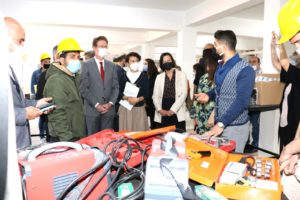
Technical Assistance for Border Enforcement of Intellectual Property Rights (IPR) for Modernization of Turkish Customs Administration VIII
It is essential to modernize customs legislation and practices in line with the EU standards for proper and effective implementation of the Union Customs Code. In this context, the purpose of the project was to improve the administrative capacity of the Turkish Customs Administration, raise awareness and increase

Technical Assistance for the Operation “Employment and Social Support Services Coordination and Implementation Model for the Integration of Disadvantaged Persons”
The case can be made that disadvantaged persons have both a lack of access and barriers of entry into the labour market. Based on this declaration, the purpose of the operation was to contribute to the sustainable integration of disadvantaged persons into the labour market by establishing and

Technical Assistance for Promoting Youth Employment in TRC3 Region
The purpose of the contract is to increase the vocational skills of young people in TRC3 Region and promote their integration into the labour market through conducting vocational and entrepreneurship training, guidance and counselling services. Also, it applies a holistic approach to increase the capacity of multiple stakeholders

Technical Assistance for Gaziantep Regional Industrial Design and Modelling Centre (GETAM)
The Gaziantep region has great potential for several manufacturing areas; however, sometimes, it requires some support from well-qualified projects to achieve adequate results. Therefore, the overall objective of the project was to increase the competitiveness and economic welfare of the Gaziantep region. More specifically, it aimed to strengthen

Enhancing the Employability of Youth and Unemployed/Low-Skilled Workers, and Improving Their Transition to Employment In Egypt
It can be claimed that advancing the structure and performance of the TVET (Technical and Vocational Education and Training) system and TVET deliveries is essential to better respond to new socio-economic needs, in particular, youth employability and increased competitiveness in the context of the country’s current and future

Capacity Development of Employees and Employers via Information and Communication Technologies (ICT)
In Turkey, in common with all other countries, both employers and employees need to be aware of, and be able to use, the latest ICT tools in the workplace to improve the efficiency and competitiveness of their businesses and take best advantage of personal development opportunities. This project,

